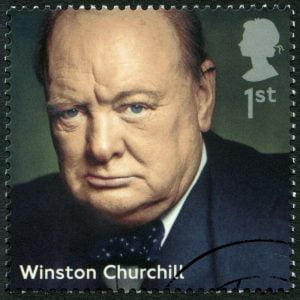
In late May of 1940, with WWII spreading from country to country across Europe, a crisis that would determine the fate of Europe, and ultimately that of the United States as well, was emerging in the British parliament. Winston Churchill had been elected Prime Minister just three weeks earlier and did not yet have the respect or popular support in the parliament that he would later have. A movement within Churchill’s small war cabinet, led by his highly respected Foreign Minister, Lord Halifax, was considering “negotiating peace” (e.g., surrendering) to Germany. Churchill was badly outnumbered in the debate and was on the verge of desperation.
What he did next should serve as an advanced lesson in persuasion, and closing the sale, for any salesperson with a work from home job.
Following the war cabinet meeting in the afternoon of May 28, where heated words were exchanged between Halifax and Churchill over the subject, there was to be a meeting of the full parliament (about 25 ministers) at 6:00 PM that evening. It had become clear to Churchill that logic and ordinary discourse would not carry the day. He had to do something dramatic.
As Prime Minister, Churchill would lead the meeting and speak first. After a few words concerning operations at Dunkirk and events in Paris, Churchill said the following:
“I have thought carefully in these last days whether it was part of my duty to consider entering into negotiations with that man. But it was idle to think that, if we tried to make peace now, we should get better terms than if we fought it out.
The German’s would demand our fleet—that would be called “disarmament”—our naval bases, and much else. We should become a slave state, though a British government which would be Hitler’s puppet would be set up . . .
And I am convinced that every man of you would rise up and tear me down from my place if I were for one moment to contemplate parley or surrender. If this long island story of ours is to end at last, let it end only when each one of us lies choking in his own blood upon the ground!”
Following the last word, there was a brief moment of silence, then roughly half of the members of parliament present at the meeting rushed toward Churchill to pat him on the back and shake his hand. There had instantly been planted in the room an exuberant resolve to “fight on.” Lord Halifax had been won over; former Prime Minister Neville Chamberlain—formerly on the fence on this matter of “seeking peace” with Germany—had come down on the Prime Minster’s side. It was done; the question had been settled; it never arose again in any significant way!
Let’s take a look at the psychology and emotional appeal of Churchill’s short, but powerful and effective speech. If your sales job allows you to work from home, try to imagine what Churchill was trying to accomplish and how he went about it. Remember, if you work from home you don’t have either the animated gestures of personal appearance or any visuals to work with that your colleagues with outside sales jobs have.
“I have thought carefully in these last days whether it was part of my duty to consider entering into negotiations with that man.”
Churchill didn’t tell the British Parliament that their desire to “seek peace” was unwise, or uninformed, or even that the consequences of doing so would be devastating. He was setting the stage for leading them toward a different conclusion than the one they currently held and held with some conviction. If we try to convince someone with logic or facts, they will tend to say: “Says who?” or, “Why should I trust your opinion?” or, possibly, “How do I even know your facts are correct?” But when a picture that will capture one’s imagination is painted vividly enough to capture the emotions as well, people will often come to see your point of view because it was their idea! Had Churchill blasted them at the outset they would have shored up their defenses against his argument and fortified their resistance! This tactic of “easing in” without offending is vitally important if you work from home and are presenting on the phone.
“But it was idle to think that, if we tried to make peace now, we should get better terms than if we fought it out.”
Again, Churchill still doesn’t tell them their idea was stupid or offend them for holding it. He simply says he found it “idle;” a not-too-inflammatory way of saying the notion “lacked value.” Actually, he’s not even saying the idea, in general, was idle, but that it was idle to think they would get better terms by surrendering than they would get if they fought on. The Prime Minister is peeling back the layers of parliament’s position gradually and carefully. By the time he is finished, there will not be enough of it left to withstand his final blow.
“The German’s would demand our fleet—that would be called “disarmament”—our naval bases, and much else. We should become a slave state, though a British government which would be Hitler’s puppet would be set up . . .“
After laying the groundwork that the terms of surrender will not necessarily be better now than they would be at the end of the war, he gently explains why. His colleagues in parliament have been viewing the decision to negotiate peace as being the difference between war and no war. Churchill now explains to them, gently, that there is much more to it than they have considered. In an argument, the mind likes to ignore the negatives and support the positives so it will come to the conclusion it is already convinced what it wants. “Disarmament” means much more than simply putting down your weapon for a time; it means you no longer have any way to protect yourself or to change anything your new “masters” are doing to you. He also tells them not to be fooled by the likelihood that Britons will remain in the country’s government; that will be for appearances only while their new masters will be calling the shots. In other words, all the nation’s freedoms will be forfeited. Note, however, he is suggesting these things for them to contemplate for themselves. They must, on their own, come to the conclusion that they have not adequately considered the downside to what they are wanting to do. Their argument is biased. They must make sure they know exactly what “negotiating peace” really means, and then they must make sure that is what they really want.
“And I am convinced that every man of you would rise up and tear me down from my place if I were for one moment to contemplate parley or surrender.”
Once the warm fuzzy feeling of avoiding war and the gratitude and praise of a grateful nation has run its course, those very members of parliament who so eagerly sought such an outcome will rail without mercy on the one man in charge, the Prime Minister, Winston Churchill, and will heap on him the full load of the responsibility for the country’s plight at that time. He will become the most hated man in Great Britain—indeed the most hated man in all of Great Britain’s history . . . and he knows it. This is another way of telling them that the long-term consequences of their position will not bring them much pleasure either.
Churchill has brought them to this place. He has set the stage, painted the picture, and now challenges them to do what they surely by now believe to be the best thing for the country. His closing statement comes next, and he minces no words.
“If this long island story of ours is to end, at last, let it end only when each one of us lies choking in his own blood upon the ground!”
Finally, with the facts his colleagues had overlooked presented in a thoughtful way, Churchill challenges them, in so many words, to step up and have the courage to be the leaders they were elected to be. He doesn’t tell them to reconsider their decision, he tells them they would be better off dead than to do what they had thought to do! This could only be said after his audience had been carefully prepared to receive it. This, of course, is over the top for a work from a home salesperson trying to promote a product or set an appointment to consider a product. But some form of painting a picture of the displeasure of making the wrong decision needs to be planted in the prospect’s mind, especially if you work from home.
Any sales job can benefit from understanding the principle of persuasion used by Winston Churchill to avert what would have no doubt been the greatest disaster in modern history. Moreover, if your sales job is one where you work from home, the necessity of using the proper approach and selection of words to guide your prospects down a similar road is essential.
As a final note, Churchill’s greatest protagonist in this whole process, Foreign Minister Lord Halifax, was not allowed to “work from home” any longer. Churchill reassigned him to the job of Ambassador to the United States . . . just to be on the safe side!
About the Author

Tracie Chancellor, CEO and Founder of TeleReach Corporate, national business to business call center specializing in sales appointment setting and lead generation, based in Houston, Texas. Chancellor is an MBA graduate of the University of Houston with over 20 years hands-on sales and marketing experience, working with privately-held businesses, universities, non-profit organizations, as well as Fortune businesses in the business to business marketing space.

